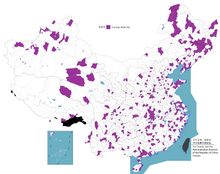County-level City
| County-level municipality County-level city |
|||||||
 |
|||||||
| Simplified Chinese | 县级市 | ||||||
|---|---|---|---|---|---|---|---|
| Traditional Chinese | 縣級市 | ||||||
|
|||||||
| Transcriptions | |
|---|---|
| Standard Mandarin | |
| Hanyu Pinyin | Xiànjíshì |
A county-level municipality (Chinese: 县级市), county-level city, or county city is a county-level administrative division of mainland China. County-level cities are usually governed by prefecture-level divisions, but a few are governed directly by province-level divisions.
Most county-level cities were created in the 1980s and 1990s by replacing counties.
A county-level city is a "city" (Chinese: 市; pinyin: shì) and "county" (Chinese: 县; pinyin: xiàn) that have been merged into one unified jurisdiction. As such it is simultaneously a city, which is a municipal entry, and a county which is an administrative division of a prefecture.
County-level cities are not "cities" in the strictest sense of the word, since they usually contain rural areas many times the size of their urban, built-up area. This is because the counties that county-level cities have replaced are themselves large administrative units containing towns, villages, and farmland. To distinguish a "county-level city" from its actual urban area (the traditional meaning of the word "city"), the term 市区 shìqū, or "urban area", is used.
In France, an equivalent of a county-level city is an agglomeration community.
...
Wikipedia
